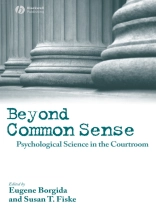Beyond Common Sense addresses the many important and controversial issues that arise from the use of psychological and social science in the courtroom. Each chapter identifies areas of scientific agreement and disagreement, and discusses how psychological science advances our understanding of human behavior beyond common sense.
- Features original chapters written by some of the leading experts in the field of psychology and law including Elizabeth Loftus, Saul Kassin, Faye Crosby, Alice Eagly, Gary Wells, Louise Fitzgerald, Craig Anderson, and Phoebe Ellsworth
- The 14 issues addressed include eyewitness identification, gender stereotypes, repressed memories, Affirmative Action and the death penalty
- Commentaries written by leading social science and law scholars discuss key legal and scientific themes that emerge from the science chapters and illustrate how psychological science is or can be used in the courts
Innehållsförteckning
Notes on Contributors.
Foreword (Mahzarin R. Banaji).
Acknowledgments.
Introduction (Eugene Borgida and Susan T. Fiske).
Part I Psychological Science on Stereotyping, Prejudice, and Discrimination.
1 Race, Crime, and Antidiscrimination (R. Richard Banks, Jennifer L. Eberhardt, and Lee Ross).
2 Discrimination in America and Legal Strategies for Reducing It (Faye J. Crosby and John F. Dovidio).
3 The Young Science of Prejudice Against Older Adults: Established Answers and Open Questions About Ageism (Todd D. Nelson).
4 Gender Prejudice: On the Risks of Occupying Incongruent Roles (Alice H. Eagly and Anne M. Koenig).
5 From the Laboratory to the Bench: Gender Stereotyping Research in the Courtroom (Laurie A. Rudman, Peter Glick, and Julie E. Phelan).
6 (Un)common Knowledge: The Legal Viability of Sexual Harassment Research (Louise F. Fitzgerald and Linda L. Collinsworth).
7 Subjectivity in the Appraisal Process: A Facilitator of Gender Bias in Work Settings (Madeline E. Heilman and Michelle C. Haynes).
Part II Psychological Science on Legal System Processes.
8 Eyewitness Identifi cation: Issues in Common Knowledge and Generalization (Gary L. Wells and Lisa E. Hasel).
9 Repressed and Recovered Memory (Elizabeth F. Loftus, Maryanne Garry, and Harlene Hayne).
10 Expert Testimony on the Psychology of Confessions: A Pyramidal Framework of the Relevant Science (Saul M. Kassin).
11 Polygraph Testing (William G. Iacono).
12 Social Science and the Evolving Standards of Death Penalty Law (Phoebe C. Ellsworth and Samuel R. Gross).
13 Pretrial Publicity: Effects, Remedies, and Judicial Knowledge (Margaret Bull Kovera and Sarah M. Greathouse).
14 Media Violence, Aggression, and Public Policy (Craig A. Anderson and Douglas A. Gentile).
Part III Commentaries.
15 The Limits of Science in the Courtroom (David L. Faigman).
16 Research on Eyewitness Testimony and False Confessions (Margaret A. Berger).
17 Commentary on Research Relevant to Sex Discrimination and Sexual Harassment (Barbara A. Gutek).
18 The Tenuous Bridge Between Research and Reality: The Importance of Research Design in Inferences Regarding Work Behavior (Frank J. Landy).
19 Psychological Contributions to Evaluating Witness Testimony (Shari Seidman Diamond).
20 Beyond Common-sense Understandings of Sex and Race Discrimination (R. Richard Banks).
21 Behavioral Realism in Law: Reframing the Discussion About Social Science’ Place in Antidiscrimination Law and Policy (Linda Hamilton Krieger).
Index.
Om författaren
Eugene Borgida is Professor of Psychology and Law at the University of Minnesota and Morse-Alumni Distinguished Professor of Psychology. He is also co-author of the forthcoming book, The Political Psychology of Democratic Citizenship (with John L. Sullivan and Christopher Federico).
Susan T. Fiske is Eugene Higgins Professor of Psychology at Princeton University. Her publications include Social Cognition: From Brains to Culture (with Shelley Taylor, 2008) and Social Beings: A Core Motives Approach to Social Psychology (2004).












